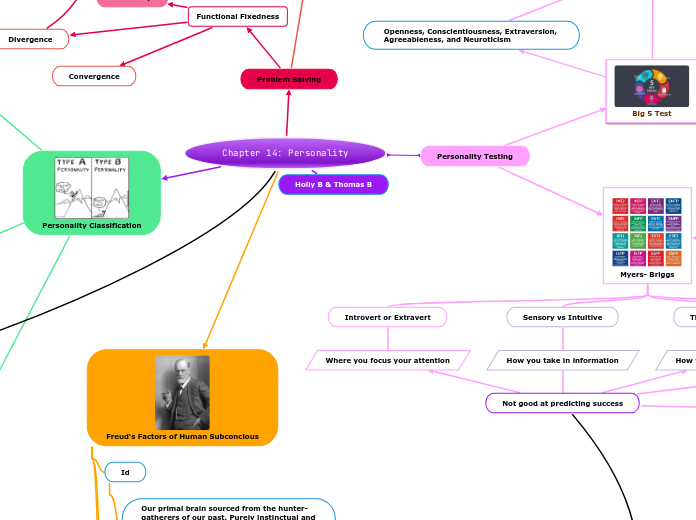por Holly Beckstette 2 anos atrás
231
Personality Testing

por Holly Beckstette 2 anos atrás
231

Mais informações
2. Fluency - How many answers
3. Originality - did anyone else come up with the same answer
4. Elaboration - does it require explanation
The idealized version of an individual's personality - the segment that manages the ego's behavior and forms complex moral standpoints and beliefs.
The ego acts as a center point between the superego and the id, controlling the Id's animalistic urges to make them more acceptable to the world while also stopping the superego from completely repressing the urges.
Our primal brain sourced from the hunter-gatherers of our past. Purely instinctual and societally unacceptable in the current day, but important for survival nonetheless. Regulated by the superego and its direct opposite.
1. Problem identified
Fixed Mindset: Lacks initiative or confidence to make improvements. Essentially the doomer mindset - setbacks often can feel like the end of the world, like the person is in question is in quicksand and can't get out.
Growth Mindset: A willingness to take failure and turn it into success - exhibits an active desire to improve. Generally sees improvements, even when failure occurs.
Growth mindsets help improve productivity and mood
EQ: Tested through various personality tests and evaluations. Score of the test taker's ability to understand other people's emotions and interact with social situations in positive ways.
Numerically quantifying systems are limited and do not provide reliable way to determine intellect and success.
IQ: Quantified through standardized testing. Score of the test taker's affinity for spatial awareness, math, and analytics.
Type B: Relaxed, steady-headed, creative. Tend to gain satisfaction from tasks involving creativity and abstract thinking. Generally laid-back and less engaged with mathematics and similar topics than type A personalities.
Type A: Anal, attentive, work-minded. Tend to prioritize hard work and gain satisfaction from accomplishing tasks that require logical thinking.
Very general and not applicable to all people. Actual humans may lean to one personality type other but the classifications are far to general to provide any concrete psychological evaluation or predict success.
Not good at predicting success